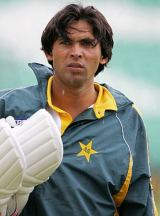
|

Mohammad Asif and Shoaib Akhtar tested positive for the banned anabolic steroid Nandrolone
© AFP
|
|
Pakistan players are regularly made fully aware of what substances they are and aren't allowed to take, according to the Pakistan Cricket Board (PCB). Speaking to Cricinfo on condition of anonymity, a PCB official said that the players were given a list every year, sanctioned by the ICC and the World Anti-Doping Agency (WADA), detailing what constitutes banned substances and what doesn't.
"We give them an updated list every year and stress to them the importance of being aware of what is allowed and what isn't. This year, just before the tour to England, we provided them with an ICC booklet with this information," the official said. "Every player is aware of exactly what is and isn't right."
Mohammad Asif and Shoaib Akhtar, Pakistan's new-ball attack, tested positive for the banned anabolic steroid Nandrolone in an internal doping test carried out by the PCB. As a result they have been called back from the Champions Trophy and now face possible disciplinary action at the hands of a PCB-instituted tribunal consisting of a former Test cricketer.
The findings initially asked questions of how much communication there is between the PCB and its players on such matters, particularly when players are injured. Significantly perhaps, both players have recently come back from injuries which kept them out of cricket for extended periods. Before he appeared in the ODI series in England recently, Shoaib had been out of the game since February with knee and ankle injuries. Asif too missed much of the Test series against England with an elbow injury.
The official, however, insisted that the PCB had played its part. "We are very particular about this. We make sure the players know what they need to, especially when injuries occur and rehabilitation needs to take place. At the end of the day, they are also professionals and should have an idea of what is going into their bodies. Steroids after all are steroids and surely, as a player, you must be aware of that."
There appears to be no global uniform policy regarding keeping players as informed as possible. Not surprisingly, Cricket Australia appears most proactive. Awareness sessions are held with players: one was held recently at the pre-season training camp. Additionally, players also have access to an information hotline in case they are unsure about certain substances.
England signed up to the WADA code earlier this year, and all England players are drug-tested as a matter of routine.
In South Africa, players were tested before they came to India for the Champions Trophy and are also provided, like their Pakistani counterparts, with booklets on relevant information. The Sri Lankan board holds awareness sessions in the academy and exercises, according to one journalist, considerable control over the players in terms of diet, training and treatment.
Shoaib has denied any wrongdoing and he is backed up by his personal doctor Dr Tauseef Razzak. The implication hidden in the official's remarks, though, is that both players should have known what they were doing. Judgment will be reserved, however, until the PCB tribunal comes to its own conclusions, or either player offers an explanation.
Osman Samiuddin is Pakistan editor of Cricinfo
